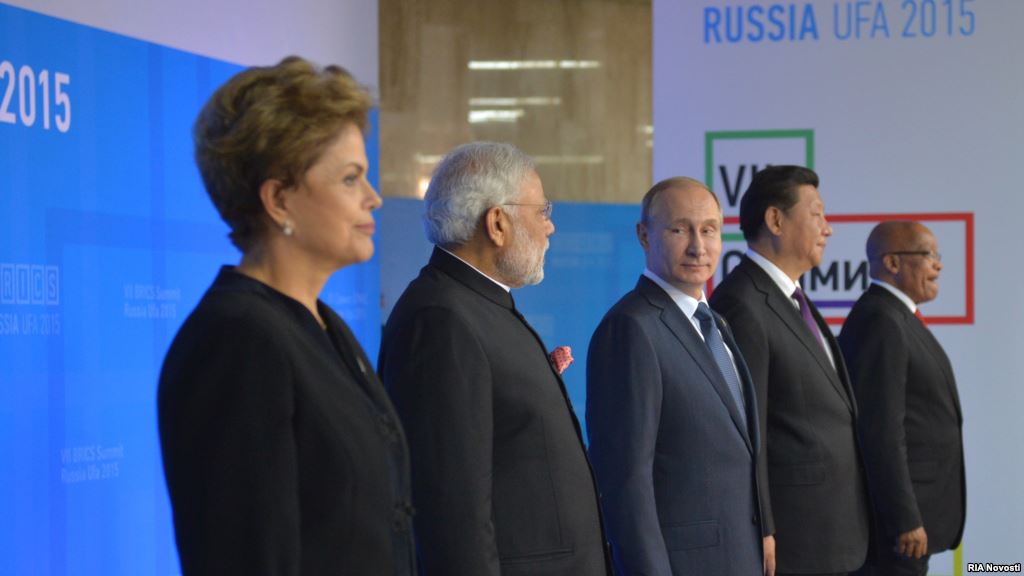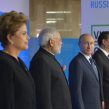
BRICS for Greece
Publication: Eurasia Daily Monitor Volume: 12 Issue: 130
By:

It appeared too great a temptation to pass up for the Kremlin when Greece’s impending default and exit from the Eurozone or even the European Union (the so-called Grexit) occurred simultaneously with the annual BRICS summit, this time under Russian leadership, in Ufa, on July 8–10. The BRICS is a loose political-economic grouping of the world’s major developing economies, Brazil, Russia, India, China and South Africa. It is quite clear from statements by Russian President Vladimir Putin, his Chinese counterpart Xi Jinping, and other assorted commentators that Moscow regards the BRICS as a means to devise alternative structures of international relations to counter Western and, especially, US leadership. Thus, the BRICS New Development Bank, which has now come into being, will, according to Putin, bankroll large-scale energy projects, including perhaps the planned Turkish Stream natural gas pipeline project that would deliver Russian gas across the Black Sea, to Turkey, and onward to Europe (RT, July 10).
This is where Greece comes in. Russia had previously offered Greece a share of receipts for allowing the projected Turkish Stream pipeline to traverse its territory, although Russia would own the pipeline to prevent the EU form asserting control over it. Now it turns out that not only did both states agree to this plan but prominent Russian officials, including Russian Deputy Finance Minister Sergei Storchak, have proposed that Greece join the new BRICS Bank and/or apply to it for credits. Russian had previously suggested that Greece join the BRICS New Development Bank back in May 2015 (RT, May 12, July 10).
Meanwhile, however, Putin’s aide Sergei Ushakov admitted that no official discussion of these ideas has occurred and that securing such credits are quite unlikely inasmuch as the BRICS Bank is still in its infancy. Therefore, such proposals should be viewed as little more than Moscow’s attempts to fracture the EU and Western global leadership—a goal that essentially underlies the BRICS as an institution and the New Development Bank as such (RT, July 7; Sputnik News, May 14; Ruptly.tv, July 9). What makes Russia’s proposal to Greece appear even less credible and clearly politically motivated is the fact that the Turkish Stream project itself is in serious financial trouble, even before construction has started (see EDM, July 10).
Beyond these questions, such Russian energy mega-project proposals underscore two other distinct and equally troubling phenomena. First, given Russia’s own economic problems, the idea of continuing to subsidize improvident foreign economies simply because Moscow perceives a chance to undermine the West evokes a return to Soviet-era traditions that both Boris Yeltsin and Putin had promised to renounce. Nonetheless Moscow has subsidized such bankrupt states and regions as Venezuela, Syria and the Serbian component of Bosnia-Herzegovina, simply for political gain (Christian Science Monitor, June 20; Interfax, August 6, 2012; Kremlin.ru, September 18, 2014). But under present conditions, such policies are economically unfeasible and their political payoff is miniscule.
Second, the idea of building up Greece through the BRICS Bank—or vice versa—does not end there. The new BRICS Bank is certainly not a purely Russian project. Indeed, Moscow is a minority stockholder, so to speak. The real power behind this bank is China. And while China may well intend to finance large-scale energy—if not other—projects through this institution, the troubled Turkish Stream pipeline is unlikely to be a top priority for Beijing. Neither is it easy to visualize China eagerly lending money to Greece, which has a history of defaults and an economic-political leadership that has acted erratically to thumb its nose at the EU on Russia’s behalf. As Moscow well knows, the Sino-Russian partnership does not work on such a basis. Finally the other BRICS members would also probably be loath to commit the kind of funding Athens needs, particularly given Greece’s fiscal track record over the past few years.
Thus while Russia will undoubtedly do everything it can and fulminate mightily in support of Greek resistance to the EU, at the end of the day, Russia’s capabilities are actually quite limited. And if Turkish Stream fails, Moscow’s capabilities will be even more seriously limited. At the same time, although China too seeks to build a new system or series of structures of international relations, Russia may find that China is even less willing to support questionable projects that involve China spending assets to prop up economies on the verge of bankruptcy. It is already learning that lesson with regard to Venezuela (Xinhuanet, June 16; CNBC, January 21). Although the publicity and focus of the Greek financial crisis is on the EU, Russia’s policies here also validate former British prime minister Margaret Thatcher’s observation that the problem with socialists is that they eventually run out of other people’s money (This Week, Thames TV, February 5, 1976, via Margaretthatcher.org, accessed July 13). While Russia is no longer a Socialist state, its economic policies, in far too many instances, continue along socialist lines that, in both Russia and Greece, have long since proven to be disastrous.




